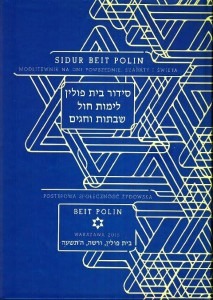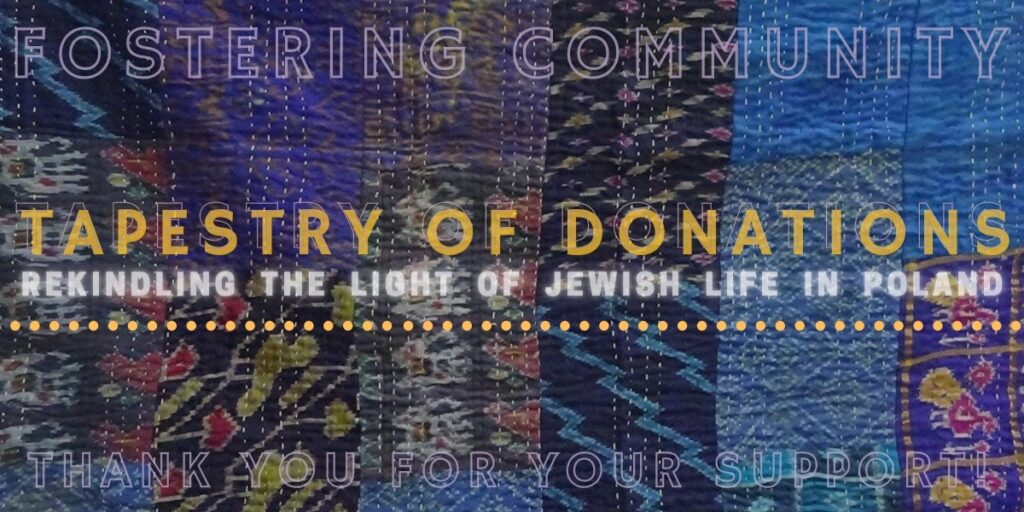Siddur Beit Polin. A prayer book for weekdays, Sabbaths and festivals, ed. Gil Nativ, Union of Progressive Jewish Communities in Poland, Warsaw 2015.
June 19th 2015 was an important date for the Progressive Jewish community in Poland – it marked the introduction of the prayer book for the Union of Progressive Jewish Communities in Poland. The ceremony was held at the Beit Warszawa synagogue. The prayer book’s editing process took many years and was completed by Rabbi Dr. Gil Nativ, who served as the Rabbi of the Warsaw Progressive synagogue for three years. This is the second Progressive siddur which has been published in Poland. The first, edited by Rabbi Salomon Spitzer, was published in Krakow in 1926.[ref] םימש ירעש Prayers for Israelites for weekdays, festivals, observances, fasts and religious rituals, translation and commentary by Salomon Spitzer, Krakow, 1926.[/ref]
Siddur Beit Polin is divided into three main parts: the Preface (p. III-XII), the Prayer section (p. 1-251) and a third part with meditations for personal reflection, entitled יברקב יפערש בורב When my cares are many within me… Meditative poetry and prose for contemporary Jews (p. 252-264) as well as with Hebrew songs – הנר לוק Songs of joy (p. 265-271). The siddur contains an appendix (p. 272-279), indexes (of Psalms, of piyyutim – religious poems and of contemporary Hebrew texts, p. 280-282) as well as a table of contents.The editing of this prayer book took many years, with many people contributing to this process.Rabbi Dr. Gil Nativ served as chief editor and as the author of commentaries. Translations from Hebrew were prepared by Katka Mazurczak, Marek Jeżowski and Rabbi Dr. Gil Nativ.Translations from English into Polish were done by Marek Jeżowski, Joanna Czopnik, Marzena Szymańska-Błotnicka and Joanna Auron-Górska. Katka Mazurczak, Judyta Awigail Sulicz and Zivah Nativ provided a transcription of Hebrew texts. Zivah Nativ also served as a Hebrew language consultant.
On the first pages of the siddur there is an Acknowledgments section, with a list of those who supported its publishing. Since most of the supporters were not Polish, this part was written in English. Names of supporters appear in the following categories: Benefactors,Partners, Sponsors and Rabbinic Sponsors. Acknowledgments are followed by a Polish and English version of the Preface written by Rabbi Dr. Gil Nativ (p. VIII-XVII). The Preface explains the principles according to which the siddur was compiled. It informs that this siddur is a comprehensive prayer book, with the exception of prayers for the High Holy Days, which will be published in a new mahzor. Since this siddur was published by a Progressive Jewish community, prayers were changed in places where traditional texts contradicted the contemporary religious consciousness of Reform Jews. For example, phrases that suggest a belief in the inferior status of women and Gentiles were removed or changed. To give an example: In the morning prayers blessings thanking God for not making one a Gentile or a woman (השא ינשע אלש … יוג ינשע אלש) were removed. Instead, the siddur offers two positive blessings: a praying person blesses God for making them a Jew and for creating them according to God’s will ( ינשעש … לארשי ינשעש ונוצרכ p. 16). In places where traditional prayers mention only the “fathers”, for example in the Amida, the “mothers” are also named. Since in Reform Judaism the arrival of the messianic era is much more important than the arrival of a Messiah from the Davidic dynasty, phrases referring to the Messiah were either removed or changed into ones mentioning redemption or the arrival of the messianic era (p. VIII-IX). Phrases expressing yearning for a Davidic kingdom were left unchanged. In addition, the Preface underlines that the siddur is supposed to reflect changes in the liturgical Hebrew-Jewish calendar which took place over the last decades. Indeed, the prayer book contains prayers for the following occasions: Shoah and Heroism Remembrance Day, Memorial Day for the Fallen Soldiers of Israel, Israeli Independence Day, Tu Bishvat and Tu B’Av. One of the reasons for celebrating these festivals is to emphasize close ties between the Polish Jewish Progressive community and the State of Israel.
The Preface is followed by an Acknowledgements section, where Rabbi Nativ expresses his gratitude to all those who contributed to the publishing of the prayer book. In addition, the introductory part explains the principles underlying the siddur’s layout, it contains a glossary of Hebrew terms and an explanation of the graphical symbols used in the prayer book. Moreover, it informs about the rules of transcription[ref]Although this section is entitled Notes on transliteration, the prayer book contains transcriptions, not transliterations. It seems that the author of this section was using the terms “transcription” and “transliteration” interchangeably, while always referring to transcription.[/ref] and it provides a list of biblical Books according to their order in the Hebrew Bible.
The Prayer section is arranged according to the principles outlined in the Preface (p. XVIII). The order of prayers reflects the order of the Hebrew day, which begins in the evening. Therefore, evening prayers precede morning prayers, which in turn come before afternoon prayers. Daily prayers precede prayers recited less frequently, for example only on Sabbath. Sabbath prayers come before prayers recited only during festivals celebrated once a year. By the same token, Sabbath prayers are preceded by blessings which are recited more frequently, i.e. blessings over food and drinks, over pleasant fragrances, blessings recited upon seeing natural phenomena or people, upon hearing good or bad news, blessings after the meal etc. (p. 70-85).
There is no separate chapter for those home ceremonies that can be performed in a synagogue. Prayers recited only at home can be found in a section called ךתיבב (In your home, p. 8-11). Since religious Jews should study a passage from the written and from the oral Torah every day, daily prayers include appropriate reading passages: The Priestly Blessing and a selection of passages from texts such as the Talmud, Midrashim, Sifra and Maimonides’Mishneh Torah (p. 19-23). In addition, the siddur contains passages from Pirkei Avot which can
be read on Sabbath afternoons during summer months (p. 193-199).
A transcription of Hebrew prayers is provided so that they can be read by those who don’t know Hebrew. Sephardic pronunciation (i.e. the one used in the State of Israel) was adopted, in accordance with the usual practice of Progressive Judaism. In transcriptions of Biblical texts God’s name is usually written as “Adonai”. In Hebrew liturgical texts the ‘ה is used, whereas in Biblical texts the Hebrew Tetragrammaton appears. The letter yod is transcribed inconsistently at the beginning of words in which it is followed by the hirek vowel. Sometimes it is transcribed with the vowel “i” (as in ךלמי, which is transcribed as “imloch”, p. 31, or לארשי, which is transcribed as “Israel”). On the other hand, sometimes it is transcribed with a “ji” (for example ךרבתי is transcribed as “jitbarach” on p. 38). At times even the same word is transcribed in two different ways, for example היהי sometimes is transcribed as “ihje” (p. 68) and sometimes as “jihje” (p. 83). In addition, the following rule is applied: a vowel that should be pronounced separately is preceded by a dash. While this is justified in cases when a closed syllable is followed by a syllable which begins with an aleph or an ayin, it’s difficult to understand why should a dash be inserted after an open syllable, for example in the word דאמ, which is transcribed as “me-od” (p. 21).
Most of the prayers and Biblical texts have Polish translations. The prayer for the Republic of Poland (p. 167) was published only in Polish. Translations are not literal, both in the case of Biblical texts as well as of prayers. For example, the doxological phrase ותוכלמ דובכ םש ךורב was translated as: “Blessed be the Divine Majesty full of glory, now and forever” (for instance on p. 8). Ps 23:6, which contains the words לכ ינופדרי דסחו בוט ךא םימי ךראל הוהי תיבב יתבשו ייח ימי was translated as: “Goodness and mercy shall not leave me for all the days of my life. I shall live with Adonai forever” [in Pol.: “pozostanę domownikiem Adonaj”].The translation of the first part of this verse portrays the Psalm’s positive statement in an antithetical way. However, it does not convey the context and the artistic features of the Psalm. Moreover, in the second part of the verse the original text refers to a temple, whereas the translation talks about “living with God”[ref]Compare with a classic commentary on the Book of Psalms: H. J. Kraus, Psalmen. I. Teilband, Neukirchen-Vluyn 1960, p. 191.[/ref]Therefore, it’s clear that the translation is supposed to reflect the religious consciousness of Progressive Judaism. In addition – as the author of this review suspects – it reflects the liturgical practice of the Warsaw synagogue.
Commentaries accompanying prayers, liturgical rituals and reading passages, as well as explanations provided for various customs and texts are undoubtedly a praiseworthy feature of the siddur.The third part of the siddur begins with יברקב יפערש בורב When my cares are many within me… Meditative poetry and prose for contemporary Jews (p. 252-264). It contains texts divided into four sections: םוקמל םדא ןיב Between man and the Omnipresent, םדאל םדא ןיב Between one man and another, ומצעל םדא ןיב Between a person and himself/herself and תומלצ איגב ךלא יכ Even though I walk through the darkest valley. Texts inspired by the Jewish experience of the Shoah. This meditative section contains texts of Jewish authors, religious leaders, philosophers and poets, but also texts of non-Jewish authors such as Czesław Miłosz, Zbigniew Herbert, Wisława Szymborska or Tadeusz Różewicz. The editor of the siddur (as well as members of the Warsaw synagogue) are aware that spirituality and sparks of religious wisdom can be found in many cultures and can be expressed by representatives of different religions.
Subsequent pages contain a selection of songs entitled הנר לוק Songs of joy. It includes both traditional songs as well as popular contemporary Israeli songs (p. 265-271). The aforementioned appendix begins with a few empty pages (p. 272-275). According to an explanation provided in the table of contents, these pages can be used by local congregations who will be using this siddur to write down principles of faith shared by their congregants. In addition, the appendix lists the order of Parashot and Haftarot, the order of Torah readings for festivals and the order in which the Five Scrolls are to be read.
Given the fact that this is only the first edition of the siddur, it does not contain many linguistic mistakes. Most of them appear in the transcription, which sometimes is inconsistent. The layout of prayers is clear and easy to follow. Unfortunately, the font size is small, which could be problematic for people with eyesight defects or for Shatzim leading public prayers.
Siddur Beit Polin is a valuable book, an indispensable publication for the Progressive Jewish Community. Christians will certainly find one aspect particularly interesting and worth emulating: The siddur strongly emphasizes the significant role played in Judaism by the theology of creation. This leads to a positive outlook on the world and creates a responsibility to care for the world’s well-being. In many places of the siddur great emphasis is placed on the relation between the horizontal and the vertical religious-ethical aspects of the life of an individual as well as of the entire society. The already mentioned prayer for Poland (p. 167) can serve as an example of this approach. It begins with a passage from Isaiah 58:6-10 – with a call to eradicate social injustice and to act righteously. Prayers for the Polish nation and for the inhabitants and leaders of Poland appear only after this introductory passage.
This prayer book, which is supposed to be used by religious communities for every day worship practices, will undoubtedly play a vital role in shaping future generations of Progressive Jews. At the same time, since it reflects beliefs held by this particular community, it provides important insights into its character. Upon reading this prayer book it becomes clear that the Polish Progressive Jewish community is open to the world, it is tolerant and it accepts religious pluralism – the principle that various people can have different, equally legitimate concepts of God. For members of this community their religion is first and foremost a commitment towards the world. As Rabbi Dr. Gil Nativ wrote in the Preface – they are striving to build a society based on mutual acceptance of different cultural and religious traditions (p. IX). At the same time, this prayer book can serve as an inspiration for representatives of faiths other than Judaism. This makes it a valuable book and a recommended reading for anyone interested in religion in general.
Andrzej P. Kluczyński was born 1972 in Łowicz (central Poland). After living many years in Bialystok he moved to Żyrardow – small town between Warsaw and Lodz. He has a wife and three sons (in the age of 12, 9 and 5). Andrzej studied theology and the Hebrew Bible at the ecumenical, belonging to the state institution of higher education – The Christian Theological Academy in Warsaw (where he works as a professor to present) and at the University in Bonn (Germany). He is the author of two books, and several dozens of articles, and his professional interests include the Hebrew Bible – especially the Books of Later Prophets and Jewish-Christian relations.
Translated from Polish by Marzena Szymańska-Błotnicka




Leave a Reply